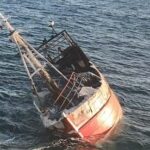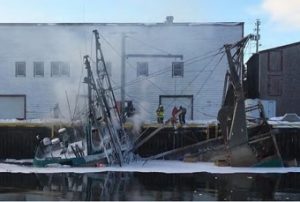Tag Archives: sustainable

Offshore Wind Farms: Wind is not the answer, it’s a false dream of unreliable energy
The plan to construct a wind farm offshore of Morro Bay is based on a whole lot of hope and not much credibility.,, The American Jobs Plan is not destined to fulfill a lasting solution to economic stability in San Luis Obispo County. There is no factual or reasonable replacement for Diablo Canyon. There’s nothing to replace the amount of sustainable, constant, reliable clean energy supplied by Diablo Canyon. There’s nothing to replace the 1,500-plus full-time positions. The New Green Deal may be green but not a good deal! There’s no receiving something 100 percent if it’s not available 100 percent. >click to read< by Ellie Ripley 14:14
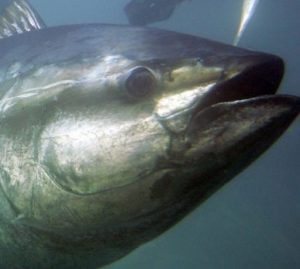
Is It Time To Start Eating Western Atlantic Bluefin Tuna? Yes, it is, Margot! Its Sustainable!
Back in January, the Monterey Bay Aquarium Seafood Watch quietly changed their sustainability rating for western Atlantic bluefin tuna from Avoid to Good Alternative. Their report states that Atlantic bluefin caught using more sustainable fishing practices (e.g., rod and reel, harpoon, or larger fishing nets called purse seines) are a good alternative to higher risk commercially fished options. The authors note that additional research would need to be done to prove definitively that the Atlantic bluefin is no longer overfished, but the evidence points toward a healthy stock. They cite low bycatch in the handline and harpoon fisheries and “moderately effective” management as reasons for the changing the rating. Randy Blankinship, chief of NMFS’ Highly Migratory Species Management Division was quoted saying “when seafood consumers purchase Atlantic bluefin tuna caught in the United States, they’re supporting robust environmental standards that bolster both bluefin populations and our economy.” This should be good news, but it’s hardly been news at all. >click to read< 08:24
Alaska fisheries thrive — yet industry is on the edge
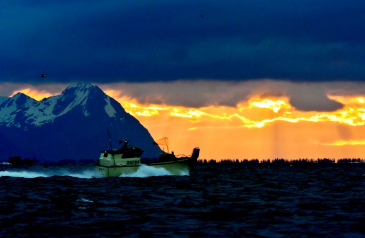 It has been a really good year across most of Alaska’s commercial fisheries. Salmon prices are up, harvests are good, fuel costs are down, and there’s more: The world’s appetite for nutritious, wild-caught Alaska fish, caught in clean waters, is growing. Alaskans’ track record for managing fisheries in a sustainable manner, both near-shore and further at sea, reinforces our reputation for responsible stewardship. Life is good.,,, Seafood employed 56,800 workers in 2015-2016 and this industry annually contributes $5.2 billion to the state’s economic output. But as good as this sounds, the fact is that this traditional industry is actually fragile,,, click here to read the story 21:45
It has been a really good year across most of Alaska’s commercial fisheries. Salmon prices are up, harvests are good, fuel costs are down, and there’s more: The world’s appetite for nutritious, wild-caught Alaska fish, caught in clean waters, is growing. Alaskans’ track record for managing fisheries in a sustainable manner, both near-shore and further at sea, reinforces our reputation for responsible stewardship. Life is good.,,, Seafood employed 56,800 workers in 2015-2016 and this industry annually contributes $5.2 billion to the state’s economic output. But as good as this sounds, the fact is that this traditional industry is actually fragile,,, click here to read the story 21:45
World-renowned chef Eric Pateman cooks up a statement on seal in Twillingate
 Along with his daily business responsibilities, Pateman travels the country and the world, espousing the delights of sustainable, local Canadian ingredients and their role in the country’s culture. In showcasing Canadian products, and with a mind to the celebration of Canada’s 150th birthday, the executive chef and president of the Edible Canada Bistro, decided to add seal meat to his restaurant’s menu for Canada’s largest food festival, Dine Out Vancouver, in February. This wasn’t done haphazardly. “I did a lot of research,” Pateman explained during a recent visit to Twillingate. “I learned about the sustainability of the product and scrutinized the ethical concerns about the seal hunt. To summarize, I didn’t find it a problem. In fact, the harvesting of seal meat, in my opinion, is certainly more ethical than most of our factory farmed foods. click here to read the story 10:09
Along with his daily business responsibilities, Pateman travels the country and the world, espousing the delights of sustainable, local Canadian ingredients and their role in the country’s culture. In showcasing Canadian products, and with a mind to the celebration of Canada’s 150th birthday, the executive chef and president of the Edible Canada Bistro, decided to add seal meat to his restaurant’s menu for Canada’s largest food festival, Dine Out Vancouver, in February. This wasn’t done haphazardly. “I did a lot of research,” Pateman explained during a recent visit to Twillingate. “I learned about the sustainability of the product and scrutinized the ethical concerns about the seal hunt. To summarize, I didn’t find it a problem. In fact, the harvesting of seal meat, in my opinion, is certainly more ethical than most of our factory farmed foods. click here to read the story 10:09
Why do some countries still hunt whale’s?
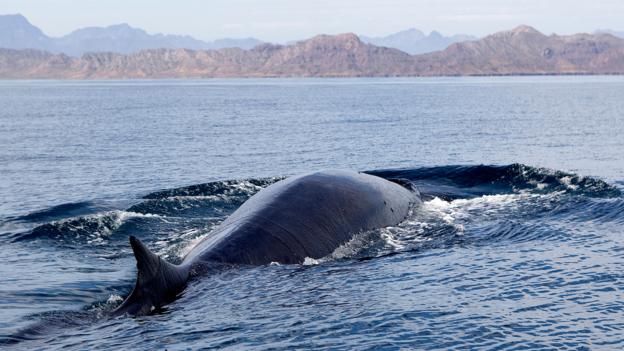 The “hacktivist” group Anonymous recently took down many Icelandic government websites, in protest at the country’s practice of . “Whales do not have a voice. We will be a voice for them. It’s time to speak out about this impending extinction of a species,,, Iceland is not the only country that still practices whaling: Norway and Japan also do so, as do a few smaller populations. This often baffles and horrifies people from elsewhere. If so many people are opposed to it, why are countries still whaling? (because they’re sustainable?) Read the article here 08:39
The “hacktivist” group Anonymous recently took down many Icelandic government websites, in protest at the country’s practice of . “Whales do not have a voice. We will be a voice for them. It’s time to speak out about this impending extinction of a species,,, Iceland is not the only country that still practices whaling: Norway and Japan also do so, as do a few smaller populations. This often baffles and horrifies people from elsewhere. If so many people are opposed to it, why are countries still whaling? (because they’re sustainable?) Read the article here 08:39






































